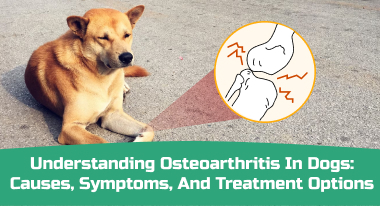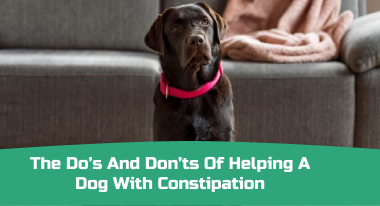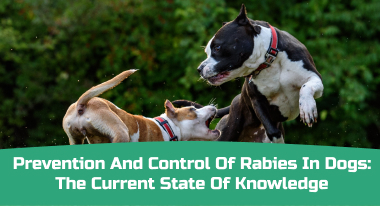Table of Contents
Gastroenteritis is an umbrella term used to describe digestive system distress and inflammation of the GI tract. Several etiologies can cause Gastroenteritis in dogs, but the most common are bacteria, viruses, and parasites. Although the exact cause of your dog’s gastritis will vary from case to case, it’s essential to recognize the symptoms and to take action as soon as possible. While some cases are mild and self-limiting, others are more severe and require immediate treatment.
Chronic Gastritis in dogs is triggered by infection or food changes. Symptoms of the infection in dogs include loose stools, frequent bathroom breaks, and weight loss. This type of Gastritis tends to last for months or even years.
The exact cause of gastric distress is not always clear, but some cases may be attributed to stress or anxiety, an underlying medical problem such as heartworm infection or stress-induced ulcers (peptic ulcer disease), natural causes such as ingestion of certain plants such as eucalyptus leaves (gastrointestinal irritation) or certain food additives, medications such as antibiotics that have caused an unnatural change in the intestinal flora or taste sensitivity to some foods.
Let’s take a look at what causes Gastroenteritis in dogs and how you can prevent it from spreading further. We also have covered the symptoms of the ailment, how it’s diagnosed and what to do if your pet has it.
What Are The Types of Gastroenteritis in Dogs
Gastroenteritis is common in canines and is characterized by inflammation of the intestinal walls and mucous membranes.
A study conducted on Gastroenteritis in dogs has shown that among the 29 cases among the 220 dogs who were suffering from acute enteritis. The same research has displayed that acute enteritis was among the predisposing factors for intestinal intussusception(a condition where one part of the intestine slides into another).
There are two primary types of Gastroenteritis in Dogs: Acute and Chronic.
- Acute Gastroenteritis In Dogs
Acute enteritis occurs suddenly, and the stomach is randomly irritated and inflamed; it can be cured with medical intervention. However, it is among dogs’ most common causes of canine acute-onset vomiting, anorexia, and diarrhea. However, it is notable that a vet examination is required as it also may be the clinical signs, such as pancreatitis, azotemia, hepatitis, and intestinal obstruction.
Hemorrhagic Gastroenteritis affects young to middle-aged, small-breed dogs. Affected animals are often previously healthy dogs with no pertinent historical information, and the signs are acute onset of bloody diarrhea, often explosive. The cause of the ailments remains unknown. However, abnormal immune responses to bacteria, bacterial endotoxin, or dietary ingredients are the reasons for the illness. The condition can affect any breed, but it is more prevalent in small and toy breed dogs such as Miniature Poodles, Miniature Schnauzers, Yorkshire Terriers, etc.
- Chronic Gastroenteritis In Dogs
- Dogs with chronic Gastritis frequently vomit. The ailment typically has an underlying illness. The significant distinction between acute and chronic Gastritis in dogs is the length of the condition.
- Atrophic Gastritis is another rare, long-term, chronic Gastroenteritis. In the ailment, the suffering pet’s stomach is gland sized.
- Chronic eosinophilic Gastritis is a condition where an abnormal number of specific white blood cells in the tissues of the stomach.
Parasites such as roundworms, hookworms, and whipworms are a common cause of Gastritis in dogs. Food intolerances can also cause this intestinal-flu if your dog’s gastrointestinal tract isn’t fully mature. If you suspect that your pet has Gastritis, see a veterinarian to help determine the cause and treat it if necessary. You should also consult your veterinarian immediately if your dog has been vomiting for more than 24 hours—he or she may have a serious underlying cause of the problem that needs to be examined.
Causes of Gastroenteritis in Dogs
The causes of gastritis in canines are the same as in humans. Parasites, bacteria, viruses, and stress are potential causes of dogs’ gastritis.
Your dog’s diet may cause this stomach disease. Your pet may be sensitive to certain food additives, which can cause gastrointestinal upset in some dogs. Stress and anxiety can also cause gastritis in dogs. If your dog has been vomiting and is also stressed, consult your veterinarian. Here’s a list of possible causes:
- Ingestion of spoiled or raw foods, or non-food items
- Viruses (parvovirus, distemper, etc.)
- Intestinal parasites
- A food allergy or sensitivity
- Gastrointestinal (GI) ulcers
- GI cancers
- Intestinal obstruction
- Genetic disease or predisposition
Table: Infectious agents can affect the GI tract: Bacteria,Virus, Parasite
| Bacteria | Virus | Parasite |
| Campylobacter spp. | Parvovirus Rotavirus | Ascarids |
| Clostridium spp. | Enteric coronavirus | Hookworms |
| Escherichia coli | Feline infectious | Whipworms |
| Salmonella spp. | peritonitis | Balantidium coli |
| Helicobacter spp. | Canine distemper virus | Coccidiosis |
Symptoms of Gastroenteritis in Dogs
- Vomiting: In the earliest stages of Gastritis and hyperemesis, vomiting is the only symptom.
- Diarrhea: Gastritis and hyperemesis can cause diarrhea. If the diarrhea is bloody, this may be an indication of a serious underlying condition.
- Increased Heart Rate: In more severe cases, dogs may have increased heart rates. This can be caused by infection, high blood sugar levels, or an electrolyte imbalance.
You also may witness signs such as:
- Large volumes of watery stool
- Blood in feces
- Lethargy
- Restlessness
- Abdominal pain
- Nausea (drooling, swallowing frequently)
Table: 2: Symptoms based on bowl anatomy
| Small Bowel Diseases | Large Bowel Disease |
| Digested Blood (Black) | Frank Blood (Red) |
| Frequent Vomiting | Rare Vomiting |
| Watery Stool | Semi Formed Stool |
| Defecation frequency is mild | Defecation frequency increases(more than 5 times/day) |
| Mucus is absent in defecation | Mucus in feces |
To shed light on the core symptoms of Gastritis in Dogs, we have devised the sign in an infographic for a crisp visual reparation. Let’s have a look:

How To Diagnose Gastritis in Dogs?
Diagnosis of Gastritis in dogs is a process that involves multiple stages. A definitive diagnosis by the vet is done and is often reached only after specific testing. The diagnosis test includes
- Complete blood cell count to examine the dehydration and infection.
- Serum chemistries and electrolytes tests aid in detecting organ system abnormalities and electrolyte imbalances.
- Urinalysis is performed to – detects urinary tract infections, kidney disease, dehydration, urine glucose, etc.
Vets also suggest abdominal radiographs (X-rays)to examine the gastric, intestinal obstruction, or other abnormal findings. Abdominal ultrasound is suggested to diagnose intestinal obstructions and other abnormalities.
Lab tests, including blood work, biochemistry profile, and fecal testing, are also performed; also vet suggestions, food, and medical. If vomiting continues, advanced tests such as endoscopy and a biopsy are recommended to reach a diagnosis.
How to Treat Gastritis in Dogs?
- Antibiotics such as metronidazole and ampicillin are effective in the treatment of bacterial infections. They can’t fight viral infections, and they’re not recommended for treating gastritis. Your veterinarian may also suggest antibiotics for your dog if the vomiting continues for more than 24 hours.
- Medical treatment and antidiarrheal drugs for severe colitis and motility-modifying agents are generally not recommended. Anti-vomit drugs such as metoclopramide are used. Also, Gastrointestinal protectants such as famotidine are used to prevent stomach ulcers.
- Food is often withheld during the initial stages of treatment for 24-48 hours and then slowly reintroduced. Small, frequent feedings of a highly digestible, low-fat diet are generally prescribed. Your veterinarian may also advise you on the best diet to feed your dog for a speedy recovery.
- Protein-losing enteropathy is another broad diagnosis that is recommended for any cause of GI disease that results in excessive loss of plasma proteins.
Conclusion
Follow-up care and monitoring are important for dog Gastroenteritis treatment. The best way to prevent your dog from getting gastritis in the future is to keep the pet healthy by feeding him or her the best diet, giving the pet daily exercise and mental stimulation, and keeping him or her away from other dogs that are infected.
If the ailment is a contagious vector, isolate your dog from your other pets. Gastro dog food such as water, Gatorade, or other electrolyte solution every 2 hours can be offered as Gastroenteritis in dog’s home treatment; however, vet consultation is highly suggested.
Dog Gastritis diet may include frequent, small meals such as boiled hamburger and rice or boiled chicken. The vet also suggests a low-fat, digestible prescription diet to cure stomach infections in dogs. Offer your pet chicken broth with added electrolytes if the vomiting is severe or he has diarrhea. Chicken broth contains nutrients such as potassium and magnesium that will help treat his condition.
The best way to prevent Gastroenteritis is by feeding your dog a good, quality diet and fresh water daily. Ensure you give your dog fresh fruits and vegetables that haven’t been frozen or canned. You should avoid giving your dog raw or undercooked meat or bones.
Disclaimer: The content on the site is for educational purposes only, and it does not provide medical advice. The shared information must not be treated as a substitute for or alternative for medical practitioner advice, diagnosis, or treatment. Regarding any concerns about your pet’s health, seeking veterinary guidance is of utmost necessity. Each pet has specific health, fitness & nutrition needs. Do not disregard, avoid or delay pet health-related advice from veterinarians based on reading the information provided on this site.
Related Gastroenteritis FAQs
- Is Gastroenteritis in dogs contagious?
Gastroenteritis in dogs can be highly contagious if the vector behind the disease is a contagious virus. The virus can be passed through saliva, vomit, feces, or direct contact with another dog or from shared water bowls.
- Can Gastroenteritis kill dogs?
It depends on the severity of the ailment in your dog. Most dogs will get better from mild Gastroenteritis within a few days, but severe bowel infection caused by the ailment can be life-threatening & may lead to death in rare cases. When left untreated, infection, such as acute hemorrhagic diarrhea syndrome (AHDS), may lead to hydration and death.
- How long does Gastroenteritis last in dogs?
Acute enteritis clears up within three days to a week. However, chronic bowel infections may last 7 weeks to 14 weeks in dogs. Gastroenteritis’s duration depends on the infection’s severity and the dog’s response to treatment.



